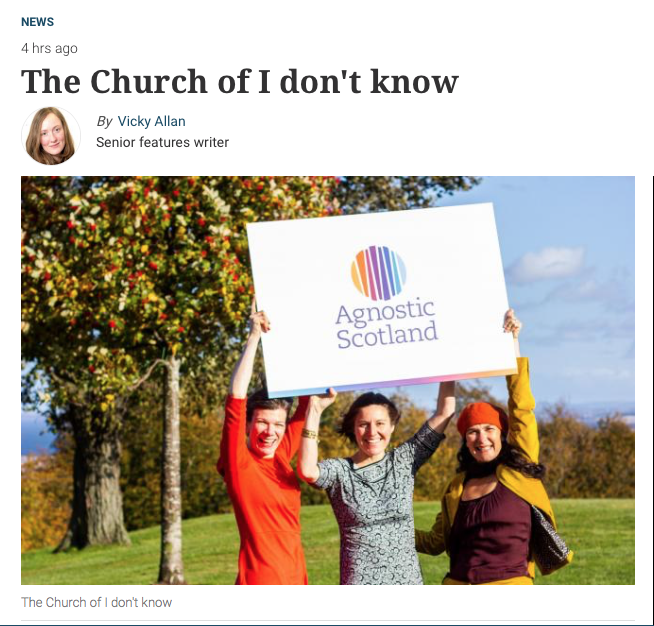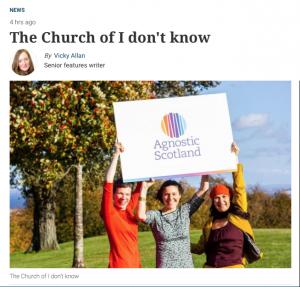I meet a lot of people who describe themselves as ‘spiritual but not religious’. As organised religion continues to decline in the Western World, it’s becoming much more normal, but despite that I was surprised when my friend Onie told me that she was starting a new organisation called ‘Agnostic Scotland’.
I have always believed agnosticism is an integral part of humanism. Charles Darwin, humanist icon and author of ‘The Origin of Species’ said ‘the mystery of the beginning of all things is insoluble by us; and I for one must be content to remain an agnostic’, and another of my literary heroes, Philip Pullman describes himself as an agnostic rather than an atheist and he has a lot to say about why imagination is at least as important to humanity as reason in this article from 2018.
It seems though that the agnostic voice in humanist thought is being drowned out by the atheist one: certainly that has been my experience here in Scotland.
As Vicky Allan wrote in her article in today’s Sunday Herald, ‘Maguire recalls having participated in a long-running internal debate in the Humanist Society Scotland, in which he argued that people should be allowed to have religious content in their ceremonies as they do in England and Wales.
On one occasion, he says, he asked Richard Holloway, why he thought there was this difference in humanist culture between Scotland and England. “He came up with a theory that it was because every new belief forms in opposition to the dominant belief of its time and place, so when humanism takes root in England it’s forming in opposition to the Anglican church, which is very nice and nobody would ever question you on your dogma. It’s accepting and warm and fuzzy. Humanism in Scotland forms in opposition to Calvinism and Scots Catholicism.”’ What the article should go on to say is, ‘which are exactly the opposite’, but you probably guessed that.
As I also said in the article, ‘”… if we have any humility we should all be agnostic. Atheism strikes me as unsupportable because it’s a certainty about something you cannot know about. For me it doesn’t matter. How you behave is much more important than what you believe.”’
I’m delighted that Agnostic Scotland has been accepted as a belief body and will be allowed to conduct legal marriage. My only regret is that its need to exist reinforces the mistaken belief that humanism necessarily equals atheism.
It doesn’t, which is why I’m glad to have found a home with my friends at Celebrate People. We see spirituality and agnosticism as integral parts of humanity and we’ll continue to quietly make the case for a more inclusive form of humanism for everyone.


0 Comments Leave a comment